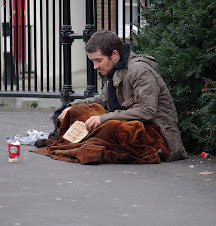Comparatively speaking, my town doesn’t have as big of a homeless problem as some of the larger communities within an afternoon’s drive from here: Billings, Rapid City, Casper and Cheyenne.
Certainly, we in rural America do not come even close to seeing the numbers of homeless in metropolitan areas – the makeshift homeless “camps” on the fringes of the cities; the alleys, bridges, the curbs, the parks, the hallways all populated with people who have no other place to go.
You have to be wary of statistics when talking about homelessness, because a nose count is impossible. One source estimates that 750,000 people per night are homeless in America, and also estimates that 9 percent of the homeless are in rural areas.
That is 67,500 people. This number is just over 12,000 more people than are estimated to live in Wyoming’s largest “city”: 55,314.
Statistics tend to make the issue of homelessness unwieldy and impersonal.
If someone in your immediate family is homeless or becomes homeless, this personalizes the issue fairly quickly. It is a big deal.
In many families, the family itself comes to the rescue and brings its beloved member back into safety and stability.
Sad to say that I have spoken with dozens of homeless people who have told me that they have family in another town or another state – sometimes even in Sheridan – but staying with them is not an option. I guess it has been a long time since ‘Ozzie and Harriet’ was on TV.
It is, however, true that the basic social units that we find ourselves a part of, can and should adequately serve, sustain and assist the homeless persons we find within those units. For example, a neighborhood. A rural neighborhood might have one or none homeless person – a guy who sleeps at the park, or holds a sign on the street.
If it is my neighborhood, I share some kind of responsibility for answering to this need.
If it is my community, the number of homeless person will go up, and so does the number of community members who share some kind of responsibility for answering to these needs.
From here, of course, we can go to county, district, region in the state, the state itself, and the state’s region in the nation, and the nation. As the perspective broadens, my individual responsibility shrinks. In rural America, the homeless are not necessarily more evident, but our individual responsibility is much greater because there are fewer of us.
Rural communities do have their own-sized homelessness to resolve. We are going to have smaller works, making huge differences in the lives of our relative few homeless and under-sheltered people. In so doing, we heal the hearts of people. What greater work is there?
Subscribe to:
Post Comments (Atom)




No comments:
Post a Comment